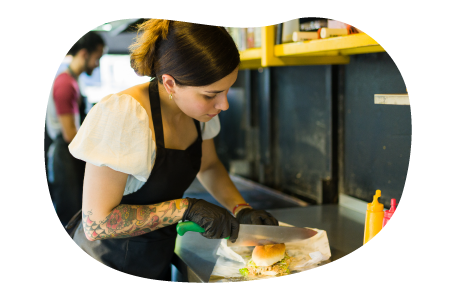
Cottage food insurance
Cottage food insurance is a crucial policy any home-based food business owner should carry. This coverage will protect your cottage food business from third-party claims of injury or damage, and may also be required to sell your goods locally and at events.
What is cottage food insurance?
Cottage food insurance protects small business owners who make beverage and food products in their homes to sell to the public.
With cottage food insurance, you can receive coverage for:
- General liability coverage, including product liability insurance
- Cyber insurance
- Tools and equipment insurance, which is a type of inland marine insurance
- Professional liability insurance, also known as errors and omissions (E&O) insurance
The above types of insurance for home-based food businesses can help cover the costs of several types of claims that can arise from making and selling food, including:
- Allergic reactions
- Food contamination and food poisoning
- Third-party bodily injuries or property damage
- Missing or damaged supplies
- Damaged rental property
This insurance policy can help safeguard your business against third-party claims, as well as help you meet requirements to sell at events, markets, or local shops.

Who needs cottage food insurance?
Anyone who makes and sells shelf-stable food and beverages from their home should carry cottage food insurance to protect their business. Whether you make baked goods, artisanal drinks, jams and jellies, or sauces, cottage food insurance is a must.
Say a home baker makes several dozen fresh cookies to sell at the local farmers market. Later on they discover the cookies caused a customer to have an allergic reaction due to traces of peanuts within them. Because the labels on homemade cookies didn't disclose potential allergens, the customer sues the home bakery business. Cottage food operations insurance would help cover the potentially devastating financial and legal liabilities of this claim.
Without food business insurance, your home kitchen is liable to pay for lawsuits and claims out of pocket because renter's or homeowner's insurance doesn't cover work-related incidents and liabilities.
What do I need to sell cottage food in my state?
It depends on your state laws and regulations for what you need in order to sell baked goods from your home. In most cases, you'll likely be required to have the necessary licenses and permits, such as a business license, catering license, or food handlers card.
Culinary entrepreneurs also need to comply with all local health department regulations and inspections, which can vary depending on where you live.
Additionally, a cottage food permit may be required in some states for home-based food businesses. A permit will determine which products you can make, like cakes and cookies, and where they can be sold. Certain foods are usually prohibited to protect consumers from potential foodborne illnesses.
Even if not required, like in California, Colorado, and Florida, you must still follow the cottage food laws in your state.
How much does cottage food insurance cost?

When calculating insurance costs and premiums for food and beverage home-based businesses, insurance companies look at several factors, including:
- The types of food and beverages made and sold
- Business equipment and property
- Annual business revenue
- The number of employees you have
- Where your business operates
- Your policy limits, deductibles, and additional insureds
Verified business insurance reviews
Hear from customers like you who purchased small business insurance.
How do I get cottage food insurance?
It’s easy to find insurance for home-based food businesses. Whether you run a small baking business, are a food vendor, or operate a food truck, you’ll need to have some basic information about your business available.
Our application will ask you for your annual revenue and payroll, among other details. You can buy a policy online and get a certificate of insurance that verifies your insurance coverage with Insureon in three easy steps:
- Complete a free online application.
- Compare free quotes and choose a policy.
- Pay for your policy and download a certificate for proof of insurance.
Insureon's licensed insurance agents work with top-rated U.S. insurance providers to find the right insurance plan for your food business needs, whether you work independently or have several employees.

